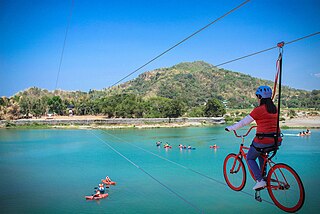
Ilocos Norte, officially the Province of Ilocos Norte, is a province of the Philippines located in the Ilocos Region. Its capital is Laoag City, located in the northwest corner of Luzon Island, bordering Cagayan and Apayao to the east, and Abra to the southeast, and Ilocos Sur to the southwest. Ilocos Norte faces the West Philippine Sea to the west and the Luzon Strait to the north.

La Union, officially the Province of La Union, is a province in the Philippines located in the Ilocos Region in the island of Luzon. Its capital is the City of San Fernando, which also serves as the regional center of the Ilocos Region.

The Ilocos Region, designated as Region I, is an administrative region of the Philippines. Located in the northwestern section of Luzon, it is bordered by the Cordillera Administrative Region to the east, the Cagayan Valley to the northeast and southeast, Central Luzon to the south, and the South China Sea to the west.

Laoag, officially the City of Laoag, is a 3rd class component city and capital of the province of Ilocos Norte, Philippines. According to the 2020 census, it has a population of 111,651 people.

Pagudpud, officially the Municipality of Pagudpud, is a 4th class municipality in the province of Ilocos Norte, Philippines. According to the 2020 census, it has a population of 25,098 people.

Badoc, officially the Municipality of Badoc, is a 3rd class municipality in the province of Ilocos Norte, Philippines. According to the 2020 census, it has a population of 32,530 people.

Pasuquin, officially the Municipality of Pasuquin, is a 3rd class municipality in the province of Ilocos Norte, Philippines. According to the 2020 census, it has a population of 29,678 people.

San Nicolas, officially the Municipality of San Nicolas, is a 1st class municipality in the province of Ilocos Norte, Philippines. According to the 2020 census, it has a population of 38,895 people.

Vintar, officially the Municipality of Vintar, is a 1st class municipality in the province of Ilocos Norte, Philippines. According to the 2020 census, it has a population of 33,339 people.

Sinait, officially the Municipality of Sinait, is a 3rd class municipality in the province of Ilocos Sur, Philippines. According to the 2020 census, it has a population of 25,998 people.

Balaoan, officially the Municipality of Balaoan, is a 1st class municipality in the province of La Union, Philippines. According to the 2020 census, it has a population of 40,339.

Bolinao, officially the Municipality of Bolinao, is a 1st class municipality in the province of Pangasinan, Philippines. According to the 2020 census, it has a population of 83,979 people.

Calanasan, officially the Municipality of Calanasan,, is a 1st class municipality in the province of Apayao, Philippines. According to the 2020 census, it has a population of 12,550 people.

Batac, officially the City of Batac, is a 5th class component city in the province of Ilocos Norte, Philippines. According to the 2020 census, it has a population of 55,484 people.

The Ilocanos, Ilokanos, or Iloko people are the third largest Filipino ethnolinguistic group. They mostly reside within the Ilocos Region, in the northwestern seaboard of Luzon, Philippines. The native language of the Ilocano people is the Ilocano language.

Basi is a native Ilocano fermented alcoholic beverage or wine made with sugarcane juice, particularly those produced in Northern Luzon particularly in Ilocos Region. This wine is processed in "burnay" or "tapayan".

The Diocese of Laoag is a Latin Church ecclesiastical jurisdiction or diocese of the Catholic Church in the Philippines.
José Garvida Flores was an Ilocano poet and playwright, from Bangui, Ilocos Norte, Philippines.
Pamulinawen may refer to:

















